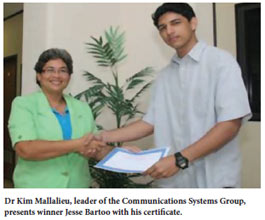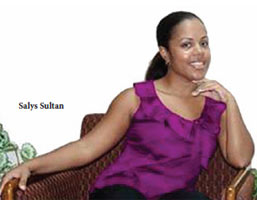 |
 |
 |
|
July 2011
|
In the first phase of the competition he was just 20, and a first-year undergraduate student of Electrical and Computer Engineering, but he was as excited as the rest at the prospect of using mobile technology to find solutions to earthly problems. This programme is led by Dr. Kim Mallalieu, Senior Lecturer and Leader of the Communications Systems Group, and is funded with the aid of a grant from the International Development Research Centre (IDRC), Ottawa, Canada.
Three Phase 1 winners were selected to advance to Phase 2 of the competition and each received US$3,000 to be used towards the development and deployment of their proposed mobile application. They were each also assigned an Alumnus of the Massachusetts Institute of Technology to serve as their Mentor throughout Phase 2. Jesse had described his project, Farmlink, at the end of Phase 1. “Farmlink embodies realistic solutions for the real life problems faced by farmers, through the effective implementation of mobile technology.”
Phase 2 of the competition required Phase 1 winners to develop and deploy their proposed mobile application, submit a proposal and video that convincingly demonstrated the operation of the mobile application, in six months. Judging criteria for the final report included relevance, potential for impact, sustainability, metrics proposed by author to measure progress against strategic goals, originality, demonstrated fitness for purpose and structured methodology. The evaluation procedure was extremely rigorous during each phase of the competition and included four high-level industry judges. Jesse and his team will be awarded up to a total of US$16,000. They will receive US$2,000 for further development of their application, US$5,000 for further deployment of their application, up to US$3,000 to attend and present at a regional conference and up to US$6,000 to visit MIT. For further information on CICMAD, please visit https://www.edu.tt/cirp/cic/ |


 On June 15, Jesse Bartoo heard the news that he was the overall winner of the CICMAD competition and he was ecstatic. Jesse, at 21, was one of the youngest competitors in the the Caribbean Innovators Challenge: Mobile Applications for Development, a component of the Caribbean ICT Research Programme Trinidad and Tobago (CIRP) in the Department of Electrical and Computer Engineering at UWI, St. Augustine.
On June 15, Jesse Bartoo heard the news that he was the overall winner of the CICMAD competition and he was ecstatic. Jesse, at 21, was one of the youngest competitors in the the Caribbean Innovators Challenge: Mobile Applications for Development, a component of the Caribbean ICT Research Programme Trinidad and Tobago (CIRP) in the Department of Electrical and Computer Engineering at UWI, St. Augustine. The extensive mobile penetration among the Caribbean poor, the tremendous versatility of mobile applications and the relatively low-cost and rapid deployment of mobile applications, all made compelling cases for mobile innovation. These led Dr. Mallalieu to offer CICMAD as an ideal model for capacity-building among Caribbean Tertiary Level Institutions (TLIs).
The extensive mobile penetration among the Caribbean poor, the tremendous versatility of mobile applications and the relatively low-cost and rapid deployment of mobile applications, all made compelling cases for mobile innovation. These led Dr. Mallalieu to offer CICMAD as an ideal model for capacity-building among Caribbean Tertiary Level Institutions (TLIs).  Phase 1 winners also include Salys Sutan with ‘mDSMS’, which is designed to provide diabetes self-management support to persons living with diabetes through the use of mobile technologies, and Ramone Graham with ‘e-Report’ which is designed to allow parents to consistently monitor their children’s performance in school and facilitate vital communication between parents and teachers.
Phase 1 winners also include Salys Sutan with ‘mDSMS’, which is designed to provide diabetes self-management support to persons living with diabetes through the use of mobile technologies, and Ramone Graham with ‘e-Report’ which is designed to allow parents to consistently monitor their children’s performance in school and facilitate vital communication between parents and teachers.